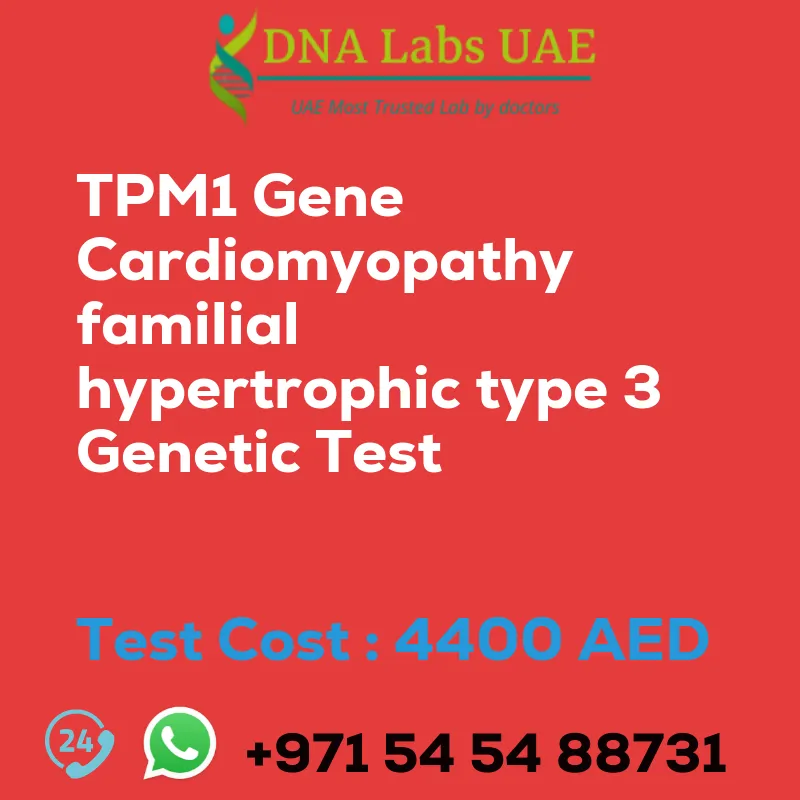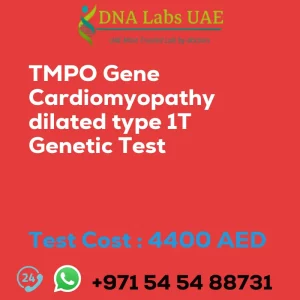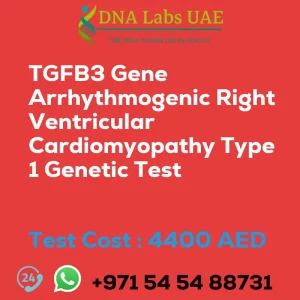TPM1 Gene Cardiomyopathy Familial Hypertrophic Type 3 Genetic Test
Components
Price: 4400.0 AED
Sample Condition: Blood or Extracted DNA or One drop Blood on FTA Card
Report Delivery: 3 to 4 Weeks
Method: NGS Technology
Test Type
Cardiovascular Pneumology Disorders
Doctor
Cardiologist
Test Department
Genetics
Pre Test Information
Clinical History of Patient who is going for TPM1 Gene Cardiomyopathy, familial hypertrophic type 3 NGS Genetic DNA Test. A Genetic Counselling session to draw a pedigree chart of family members affected with TPM1 Gene Cardiomyopathy, familial hypertrophic type 3 NGS Genetic DNA Test gene TPM1
Test Details
TPM1 gene cardiomyopathy, familial hypertrophic type 3 is a specific type of genetic disorder that affects the heart muscle. It is caused by mutations in the TPM1 gene, which provides instructions for making a protein called tropomyosin 1. This protein is involved in the regulation of muscle contraction.
Familial hypertrophic cardiomyopathy (FHC) is a condition characterized by the thickening of the heart muscle, particularly the walls of the left ventricle. This can lead to symptoms such as shortness of breath, chest pain, fatigue, and an increased risk of abnormal heart rhythms.
NGS (Next-Generation Sequencing) genetic testing is a type of genetic test that uses advanced technology to analyze multiple genes simultaneously. In the case of TPM1 gene cardiomyopathy, familial hypertrophic type 3, NGS genetic testing can identify mutations in the TPM1 gene that are associated with this specific form of cardiomyopathy.
By identifying these mutations, NGS genetic testing can help in the diagnosis of familial hypertrophic cardiomyopathy and provide valuable information for genetic counseling and management of the condition. It can also be used for predictive testing in at-risk individuals who have a family history of the disorder.
Overall, TPM1 gene cardiomyopathy, familial hypertrophic type 3 NGS genetic testing plays a crucial role in the accurate diagnosis and management of this specific form of cardiomyopathy.
| Test Name | TPM1 Gene Cardiomyopathy familial hypertrophic type 3 Genetic Test |
|---|---|
| Components | |
| Price | 4400.0 AED |
| Sample Condition | Blood or Extracted DNA or One drop Blood on FTA Card |
| Report Delivery | 3 to 4 Weeks |
| Method | NGS Technology |
| Test type | Cardiovascular Pneumology Disorders |
| Doctor | Cardiologist |
| Test Department: | Genetics |
| Pre Test Information | Clinical History of Patient who is going for TPM1 Gene Cardiomyopathy, familial hypertrophic type 3 NGS Genetic DNA Test. A Genetic Counselling session to draw a pedigree chart of family members affected with TPM1 Gene Cardiomyopathy, familial hypertrophic type 3 NGS Genetic DNA Test gene TPM1 |
| Test Details |
TPM1 gene cardiomyopathy, familial hypertrophic type 3 is a specific type of genetic disorder that affects the heart muscle. It is caused by mutations in the TPM1 gene, which provides instructions for making a protein called tropomyosin 1. This protein is involved in the regulation of muscle contraction. Familial hypertrophic cardiomyopathy (FHC) is a condition characterized by the thickening of the heart muscle, particularly the walls of the left ventricle. This can lead to symptoms such as shortness of breath, chest pain, fatigue, and an increased risk of abnormal heart rhythms. NGS (Next-Generation Sequencing) genetic testing is a type of genetic test that uses advanced technology to analyze multiple genes simultaneously. In the case of TPM1 gene cardiomyopathy, familial hypertrophic type 3, NGS genetic testing can identify mutations in the TPM1 gene that are associated with this specific form of cardiomyopathy. By identifying these mutations, NGS genetic testing can help in the diagnosis of familial hypertrophic cardiomyopathy and provide valuable information for genetic counseling and management of the condition. It can also be used for predictive testing in at-risk individuals who have a family history of the disorder. Overall, TPM1 gene cardiomyopathy, familial hypertrophic type 3 NGS genetic testing plays a crucial role in the accurate diagnosis and management of this specific form of cardiomyopathy. |








